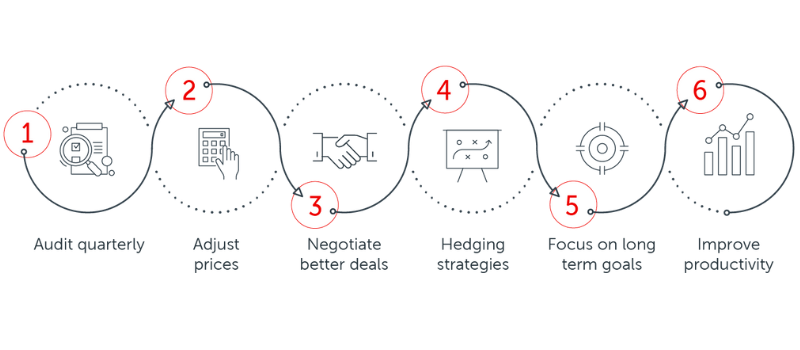Inflation preparedness for small businesses

Finance & Accounting
14 week ago — 4 min read
Get your business prepared for inflation
Preparing your business for inflation is crucial for maintaining profitability and ensuring long-term success, especially for new entrepreneurs. Inflation can increase costs and reduce purchasing power, but with the right strategies, you can navigate these challenges effectively.

Practical steps to help your business stay ahead of inflation.
1. Audit quarterly
Regular audits are essential to understanding your financial health and identifying areas where costs can be controlled. Conducting quarterly audits allows you to:
- Monitor expenses and revenues closely.
- Identify unnecessary expenditures.
- Adjust your budget to reflect current economic conditions.
2. Adjust prices
As costs rise, it may be necessary to adjust your prices to maintain profitability. However, price increases should be done strategically to avoid losing customers. Consider the following:
- Gradually increase prices to minimize the impact on customers.
- Communicate transparently with your customers about why price adjustments are necessary.
- Offer value-added services to justify higher prices.
3. Negotiate better deals
Inflation can squeeze your margins, so negotiating better deals with suppliers is crucial. Building strong relationships with suppliers can help you secure more favorable terms. Tips for negotiating better deals include:
- Bulk purchasing to receive discounts.
- Long-term contracts that lock in current prices.
- Exploring alternative suppliers to find more competitive pricing.
4. Implement hedging strategies
Hedging strategies can protect your business from the adverse effects of inflation. These strategies can include:
- Investing in assets that typically appreciate with inflation, such as real estate or commodities.
- Using financial instruments like futures contracts to lock in prices for raw materials.
- Diversifying your investment portfolio to spread risk.
5. Focus on long-term goals
While managing day-to-day operations is important, keeping an eye on long-term goals ensures your business remains resilient. Long-term planning involves:
- Setting clear, achievable goals for the next 5-10 years.
- Continuously innovating and adapting to market changes.
- Investing in research and development to stay competitive.
6. Improve productivity
Enhancing productivity can help offset the rising costs associated with inflation. Improving productivity involves:
- Investing in technology that automates routine tasks and reduces labor costs.
- Training employees to enhance their skills and efficiency.
- Streamlining processes to eliminate waste and improve output.
Inflation presents challenges, but with proactive strategies, you can prepare your business to withstand economic pressures. Regular audits, strategic price adjustments, negotiating better deals, implementing hedging strategies, focusing on long-term goals, and improving productivity are key steps to keep your business thriving. By staying vigilant and adaptable, you can ensure your business not only survives but also prospers in an inflationary environment.
For small businesses to flourish, it is essential to focus on strategic planning and result-oriented goals. By honing in on these key principles, entrepreneurs can seize business opportunities and thrive. Learn more
Posted by
GlobalLinker StaffWe are a team of experienced industry professionals committed to sharing our knowledge and skills with small & medium enterprises.
View GlobalLinker 's profile
Other articles written by GlobalLinker Staff
All you need to know about cash flow management
13 week ago
Managing your business through mobile
14 week ago
Retirement planning for the self employed
14 week ago
Most read this week












Comments
Share this content
Please login or Register to join the discussion